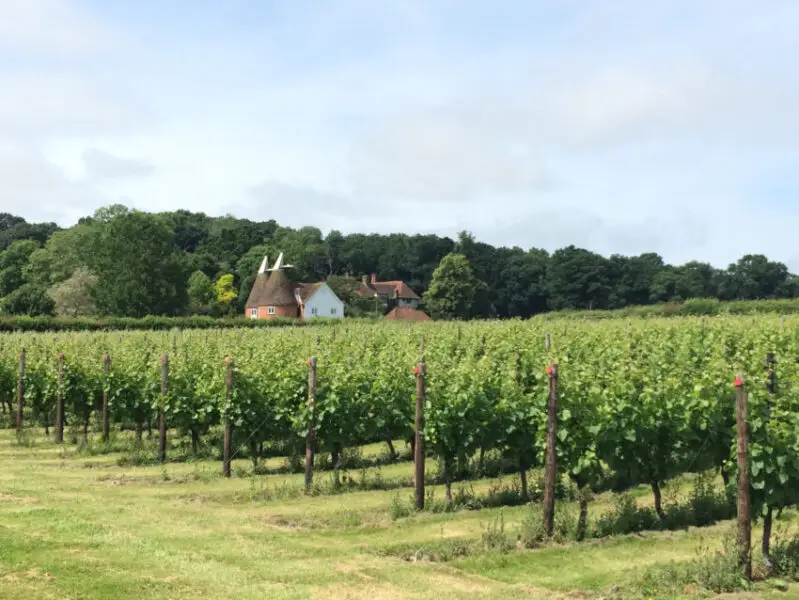The English wine industry has been undergoing a remarkable transformation. Driven by increased investment and a growing number of international awards, this sector is now captivating investors and gaining global recognition.
Meanwhile, the number of hectares under vine has more than doubled, and the number of wineries has surged, reflecting the boom in this industry. This story delves into the factors behind the industry’s rapid growth and its promising future.
Rising Investment and Vineyard Expansion
The English wine industry is undergoing a significant transformation. One of the key drivers is increased investment. The number of hectares under vine has more than doubled over the past decade to around 4,000. This increase is largely due to high-net-worth individuals recognising the potential of English wine.
The number of wineries has also surged by more than 50%. Now, there are just over 200 wineries in the UK. Similarly, the number of vineyards has doubled to about 950, which is a testament to the growing interest in this thriving industry.
Recognition and Awards
The quality of UK sparkling wine is garnering international recognition. Numerous awards have been won, showcasing the excellence of the product. Notably, Chapel Down Group secured 28 accolades in 2023 alone, gaining gold medals in the International Wine Challenge, Decanter World Wine, and WineGB awards.
Andrew Carter, the chief executive of Chapel Down, stated, “The English wine industry is enjoying the fruits of its extraordinary terroir, favourable climate, and sustained investment to create a new, internationally acclaimed wine region.” This statement highlights the key factors contributing to the industry’s success.
Chapel Down, the largest producer, is planning significant expansion. They recently announced a review to raise funds for further growth, attracting prominent investors like Nigel Wray and Lord Spencer of Alresford.
Significant Investors and Market Expansion
The industry is attracting notable investors. For example, Lord Ashcroft holds a 66% stake in Gusbourne, which has been actively increasing its export efforts. Gusbourne now exports to 35 markets, including Scandinavia, Japan, and the United States, contributing 21% to its total net revenue.
Jonathan White, Gusbourne’s chief executive, mentioned the intriguing opportunities in China. However, he emphasised the need for caution due to the market’s complexities.
Gusbourne was established in 2004 and produces both red and sparkling wines. Their sparkling wines are particularly notable, with prices ranging from £45 to £195 for their exclusive Fifty One Degrees North label. The company has 93 hectares of mature vineyards in Kent and West Sussex and plans to plant an additional 55 hectares in Kent.
Geographical Diversification
The growth of the English wine industry is not limited to traditional regions. While areas like Kent, West and East Sussex, and Surrey have been historical hubs, new regions are now coming into play.
Hampshire, Essex, Cornwall, and even Scotland are seeing vineyard expansions. This geographical diversification shows the widespread potential for growing vineyards across the country.
Modern vine planting in England started about 80 years ago in Hambledon, Hampshire. More serious planting of Chardonnay, Meunier, and Pinot Noir began only 50 years ago, revealing the relatively recent dedication to high-quality wine production.
Challenges in Land Prices
Land prices are a considerable challenge for the industry. Prime vineyard land in Kent costs over £10,000 per acre. Nyetimber, another key player, reportedly paid £16,000 per acre.
Between 2018 and 2022, nearly £500 million was invested in land. The best vineyards fetch three times the average price of arable land, indicating the premium placed on suitable vineyard locations.
Ambitious Expansion Plans
Chapel Down has ambitious plans for expansion, estimated to cost between £25 million and £30 million. These plans include a new winery near Canterbury, new vineyard planting, and development at their Tenterden base.
While an AIM listing was considered for fundraising, a company sale is also on the table. This has sparked industry speculation about potential overseas interest. Significant foreign investments have already been made, such as Taittinger’s new winery in Kent and Henkell Freixenet’s acquisition of Bolney Wine Estate in West Sussex.
Foreign Investments
Foreign investments play a significant role in the industry’s growth. Last year, Berry Bros & Rudd and Symington Family Estates jointly acquired Hambledon Vineyard for £22.3 million. This acquisition was seen as a strategic diversification opportunity.
Andrew Carter predicts further consolidation within the English wine industry, which currently has only 3% foreign ownership. However, one winemaker cautioned about valuation challenges due to limited market evidence.
Balfour Winery on the Hush Heath Estate expects to produce 900,000 bottles this year, with 10% destined for export. Richard Balfour-Lynn, reflecting on his past financial losses in property, warned about the rapid growth in the wine industry: “The question one should ask them is: ‘Who are you going to sell to, and what product are you going to sell?’”
The future of the UK sparkling wine industry looks bright. With substantial investments, increasing vineyard areas, and a growing number of international awards, the sector is poised for continued success. Challenges remain, such as the high cost of land, but innovative strategies and foreign investments are set to drive further growth.
As UK sparkling wine continues to gain recognition, both domestically and internationally, the industry will undoubtedly keep evolving and expanding. This growth reflects the dedication and resilience of those involved in this burgeoning field.

